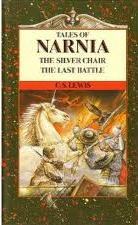- Bible
- Read the Bible
- Bible Versions
- Verse of the Day
- Reading Plans
- Verses by Topic
- Books of the Bible
- Bible Images
- Study
- Commentaries
- Concordances
- Dictionaries
- Encyclopedias
- Sermons
- Bible Atlas & Maps
- BP Wiki
- Devotionals
- Today's Devotionals
- Light of the World
- All Devotionals
- Inspirational Quotes
- More
- Picture Quotes
- Videos
- Inspirational
- Bible Study
- What The Bible Says
- Bible Q&As
- Daily Bread
- Bible by Genre
- Bible Stories
- Random Bible Verse
- Community
- Store
The Silver Chair and The Last Battle
by C.S. Lewis
The Silver Chair:The Silver Chair:
NARNIA . . . where owls are wise, where some of the giants like to snack on humans (and, if carefully cooked, on Marsh-wiggles, too), where a prince is put under an evil spell . . . and where the adventure begins. Eustace and Jill escape from the bullies at school through a strange door in the wall, which, for once, is unlocked. It leads to the open moor . . . or does it? Once again Aslan has a task for the children, and Narnia needs them. Through dangers untold and caverns deep and dark, they pursue the quest that brings them face to face with the evil Witch. She must be defeated if Prince Rilian is to be saved. Enter this enchanged world countless times in The Chronicles of Narnia.
The Last BattleThe Last Battle:
The last battle is the greatest of all battles.
Narnia ... where lies breed fear ... where loyalty is tested ... where all hope seems lost.
During the last days of Narnia, the land faces its fiercest challenge -- not an invader from without but an enemy from within. Lies and treachery have taken root, and only the king and a small band of loyal followers can prevent the destruction of all they hold dear in this, the magnificent ending to The Chronicles of Narnia.
NARNIA . . . where owls are wise, where some of the giants like to snack on humans (and, if carefully cooked, on Marsh-wiggles, too), where a prince is put under an evil spell . . . and where the adventure begins. Eustace and Jill escape from the bullies at school through a strange door in the wall, which, for once, is unlocked. It leads to the open moor . . . or does it? Once again Aslan has a task for the children, and Narnia needs them. Through dangers untold and caverns deep and dark, they pursue the quest that brings them face to face with the evil Witch. She must be defeated if Prince Rilian is to be saved. Enter this enchanged world countless times in The Chronicles of Narnia.
The Last BattleThe Last Battle:
The last battle is the greatest of all battles.
Narnia ... where lies breed fear ... where loyalty is tested ... where all hope seems lost.
During the last days of Narnia, the land faces its fiercest challenge -- not an invader from without but an enemy from within. Lies and treachery have taken root, and only the king and a small band of loyal followers can prevent the destruction of all they hold dear in this, the magnificent ending to The Chronicles of Narnia.
BUY NOW
Hardcover, 384 pages
Published January 1st 1990 by Collins (first published 1956)
tags: audiobook, classics, high fantasy, fantasy, young adult, fiction, childrens, christian fiction
Book Quotes
© 2025 Bibleportal.com All rights reserved.

Clive Staples Lewis was born in Ireland, in Belfast on 29 November 1898. His mother was a devout Christian and made efforts to influence his beliefs. When she died in his early youth her influence waned and Lewis was subject to the musings and mutterings of his friends who were decidedly agnostic and atheistic. It would not be until later, in a moment of clear rationality that he first came to a belief in God and later became a Christian.
C. S. Lewis volunteered for the army in 1917 and was wounded in the trenches in World War I. After the war, he attended university at Oxford. Soon, he found himself on the faculty of Magdalen College where he taught Mediaeval and Renaissance English.
Throughout his academic career he wrote clearly on the topic of religion. His most famous works include the Screwtape Letters and the Chronicles of Narnia. The atmosphere at Oxford and Cambridge tended to skepticism. Lewis used this skepticism as a foil. He intelligently saw Christianity as a necessary fact that could be seen clearly in science.
"Surprised by Joy" is Lewis's autobiography chronicling his reluctant conversion from atheism to Christianity in 1931.
... Show more